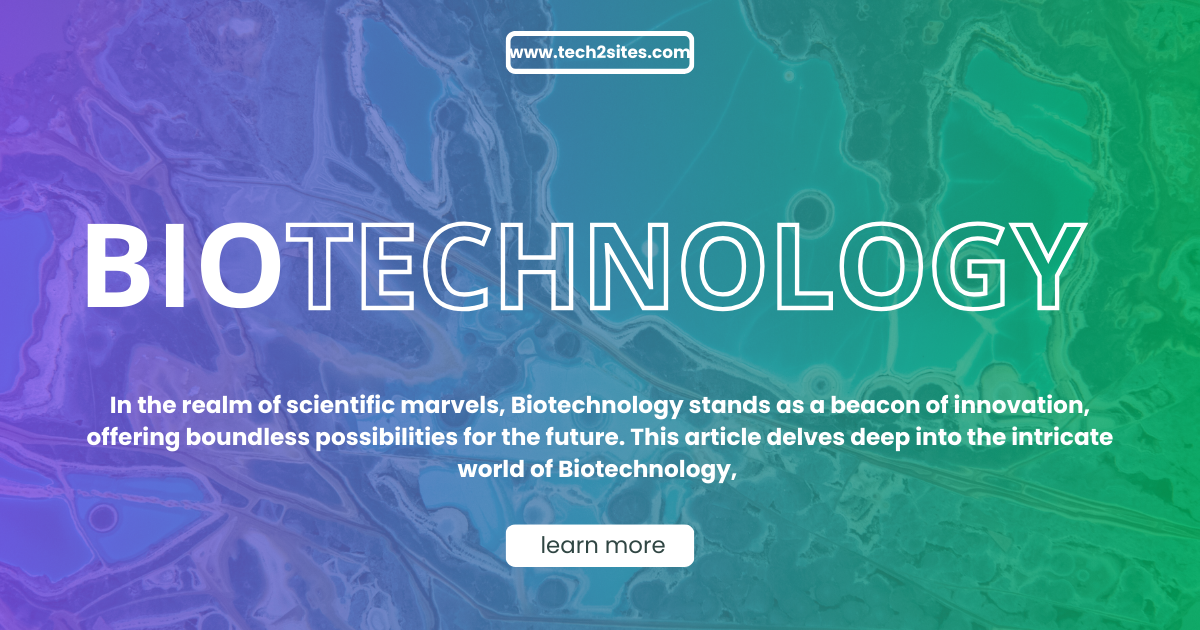Biotechnology: Unraveling Nature’s Secrets for a Brighter Tomorrow

Biotechnology: Unraveling Nature’s Secrets for a Brighter Tomorrow
Introduction
In the realm of scientific marvels, Biotechnology stands as a beacon of innovation, offering boundless possibilities for the future. This article delves deep into the intricate world of Biotechnology, exploring its history, current applications, and the promising horizons it unveils.
Biotechnology: A Journey Through Time and Innovation
Biotechnology, the fusion of biology and technology, has a rich history dating back to ancient civilizations. From fermentation processes in brewing to the discovery of DNA’s structure, humanity’s understanding of biological systems has paved the way for revolutionary advancements.
Ancient Roots of Biotechnology
In ancient times, civilizations harnessed biotechnology unknowingly. Fermentation, a fundamental biotechnological process, was utilized to create beverages like beer and wine. This early application laid the groundwork for future scientific exploration.
The Birth of Modern Biotechnology
The 20th century witnessed an explosion of biotechnological discoveries. The unraveling of DNA’s double helix structure by Watson and Crick in 1953 heralded a new era. This breakthrough paved the way for genetic engineering, biopharmaceuticals, and agricultural innovations.
Biotechnology Today: Transforming Industries
In the contemporary landscape, Biotechnology is omnipresent, transforming diverse sectors with its applications.
Biotechnology in Medicine
Biotechnological advancements have revolutionized healthcare. From personalized medicine to gene therapy, Biotechnology plays a pivotal role in diagnosing, treating, and preventing diseases.
Biotechnology in Agriculture
Modern agriculture benefits immensely from Biotechnology. Genetically modified crops withstand pests and adverse climates, ensuring food security. Biotechnological innovations enhance crop yield, fostering sustainable agriculture practices.
Biotechnology in Environmental Conservation
Biotechnology contributes significantly to environmental preservation. Bioremediation, the use of organisms to clean polluted environments, offers eco-friendly solutions. Additionally, biodegradable materials combat plastic pollution, heralding a greener future.
Frequently Asked Questions (FAQs)
Q: What are the ethical considerations in Biotechnology research?
Ethical concerns in Biotechnology primarily revolve around genetic engineering, cloning, and gene editing. Striking a balance between scientific progress and ethical boundaries is crucial, ensuring responsible Biotechnological advancements.
Q: How does Biotechnology impact the pharmaceutical industry?
Biotechnology revolutionized pharmaceuticals, enabling the production of biopharmaceuticals like insulin and vaccines. This ensures efficient treatments for various diseases, improving global healthcare.
Q: Can Biotechnology solve environmental challenges?
Absolutely. Biotechnology offers sustainable solutions to environmental problems. From wastewater treatment to developing biofuels, Biotechnology mitigates environmental challenges, promoting a healthier planet.
Q: What role does Biotechnology play in renewable energy?
Biotechnology contributes to renewable energy through biofuel production. Microorganisms are harnessed to convert organic matter into biofuels, reducing reliance on fossil fuels and mitigating climate change.
Q: Is Biotechnology limited to large industries, or can individuals contribute?
Biotechnology is accessible to individuals, especially in the realm of DIY biology. Amateur scientists and biohackers explore Biotechnology in home labs, fostering innovation from diverse perspectives.
Q: What is the future of Biotechnology?
The future of Biotechnology holds limitless potential. Advancements in gene editing, regenerative medicine, and synthetic biology promise breakthroughs in healthcare, agriculture, and environmental conservation, shaping a sustainable future for humanity.
Conclusion
In the tapestry of scientific achievements, Biotechnology emerges as a vibrant thread, weaving together biology and technology for a brighter tomorrow. From ancient fermentation processes to CRISPR gene editing, the journey of Biotechnology exemplifies human ingenuity and resilience. As we stand on the cusp of unprecedented discoveries, embracing Biotechnology’s ethical and innovative facets is paramount.



